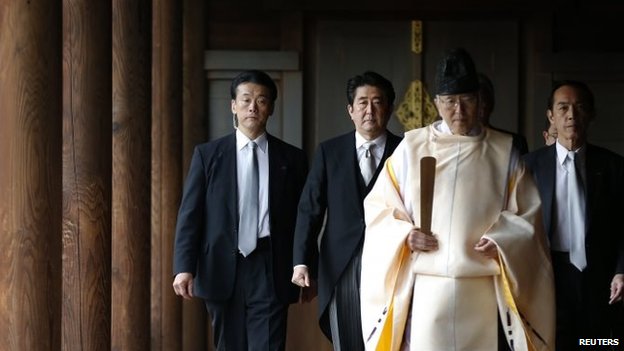
January 1, 2014, by Tony Hong
Commemoration or Provocation?
By Dr. David O’Brien,
Assistant Professor, School of Contemporary Chinese Studies at the University of Nottingham Ningbo China.
Japanese Prime Minister Shinzo Abe is no longer welcome in China because of his visit to a shrine honouring war criminals, as relations between the two countries become ever more strained.
Abe’s visit to the Yasukuni shrine was the first time a Japanese Prime Minister has visited in seven years. In Shinto belief the shrine holds the souls of over 2.4 million Japanese killed in wars from 1867 to the Second World War. Initially war criminals prosecuted by the International Military Tribunal for the Far East were excluded but 14 “Class A” war criminals were added from the late 1960s including executed war-time leader Hideki Tojo.
The visit significantly escalates tensions between the two countries currently locked in a bitter territorial dispute over the Diaoyu islands in the East China Sea.
On Sunday Chinese Foreign Ministry spokesman Qin Gang said; “Since assuming office, Abe has miscalculated on Sino-Japan ties, and made mistake after mistake, especially visiting the Yasukuni Shrine which houses class A war criminals. These people are fascists, the Nazis of Asia,” Qin said. “Of course the Chinese people don’t welcome such a Japanese leader, and Chinese leaders will not meet him. Abe has himself shut the door on talks with Chinese leaders” (South China Morning Post December 30 2013).
South Korea also strongly criticised the visit and Japan’s closest ally the US, said it was “disappointed”.
The Chinese newspaper Global Times was especially vociferous saying Abe has “acted like a political hoodlum” and compared him to a “terrorist” and a “fascist” (Global Times Dec 27 2013).
During his previous short reign as Prime Minister in 2006-07, Abe did not visit the shrine but has since said he regrets this. Following the visit he said his intention had not been to hurt the feelings of neighbours but to honour those that had died fighting for Japan.
“There is criticism based on the misconception that this is an act to worship war criminals, but I visited Yasukuni shrine to report to the souls of the war dead on the progress made this year and to convey my resolve that people never again suffer the horrors of war,” he told reporters (Irish Times Dec 27 2013).
The Empire’s brutal occupation of its Asian neighbours is still a highly emotive issue in the region and Japan seems unwilling or perhaps unable to atone for the wartime atrocities carried out in its name. While Germany underwent a deep and traumatic period of coming to terms with its wartime actions, a strong belief exists in China that Japan has refused to undergo a similar process.
Japan formally apologized in 1993 to Chinese and Korean women who were forced into wartime brothels for Japanese soldiers, and in 1995 to nations that suffered from Japanese aggression during the war. In May the Abe government said it will abide by these official apologies and backed away from earlier suggestions that the government might try to revise or even repudiate the apologies. Mr. Abe, whose political base is in the right wing of the conservative Liberal Democratic Party, had called for revising one or both of those apologies before he became prime minister after elections in December. (New York Times May 7 2013). “I want to issue a forward-looking statement that is appropriate for the 21st century,” he said at the time (Reuters Dec 31 2012).
Abe is from a one of Japan’s most prominent political families. His grandfather Nobusuke Kishi was a wartime cabinet minister who was imprisoned but never tried as a war criminal after the war and went on to serve as Prime Minister.
With Sino-Japanese relations at a particularly low point, Abe may have felt he had little to lose with a visit that was always certain to be provocative. The nationalist wing of the LDP may also have put him under pressure to visit the shrine. While currently popular in the polls, Abe will keenly remember his disastrous previous stint as prime minister and seems to be keen to shore up support. Yet his visit to the Kasunzi shrine could not have come at worse time and tensions are now likely to escalate even further. Expect no China-Japan-South Korea anytime soon.
No comments yet, fill out a comment to be the first

Leave a Reply